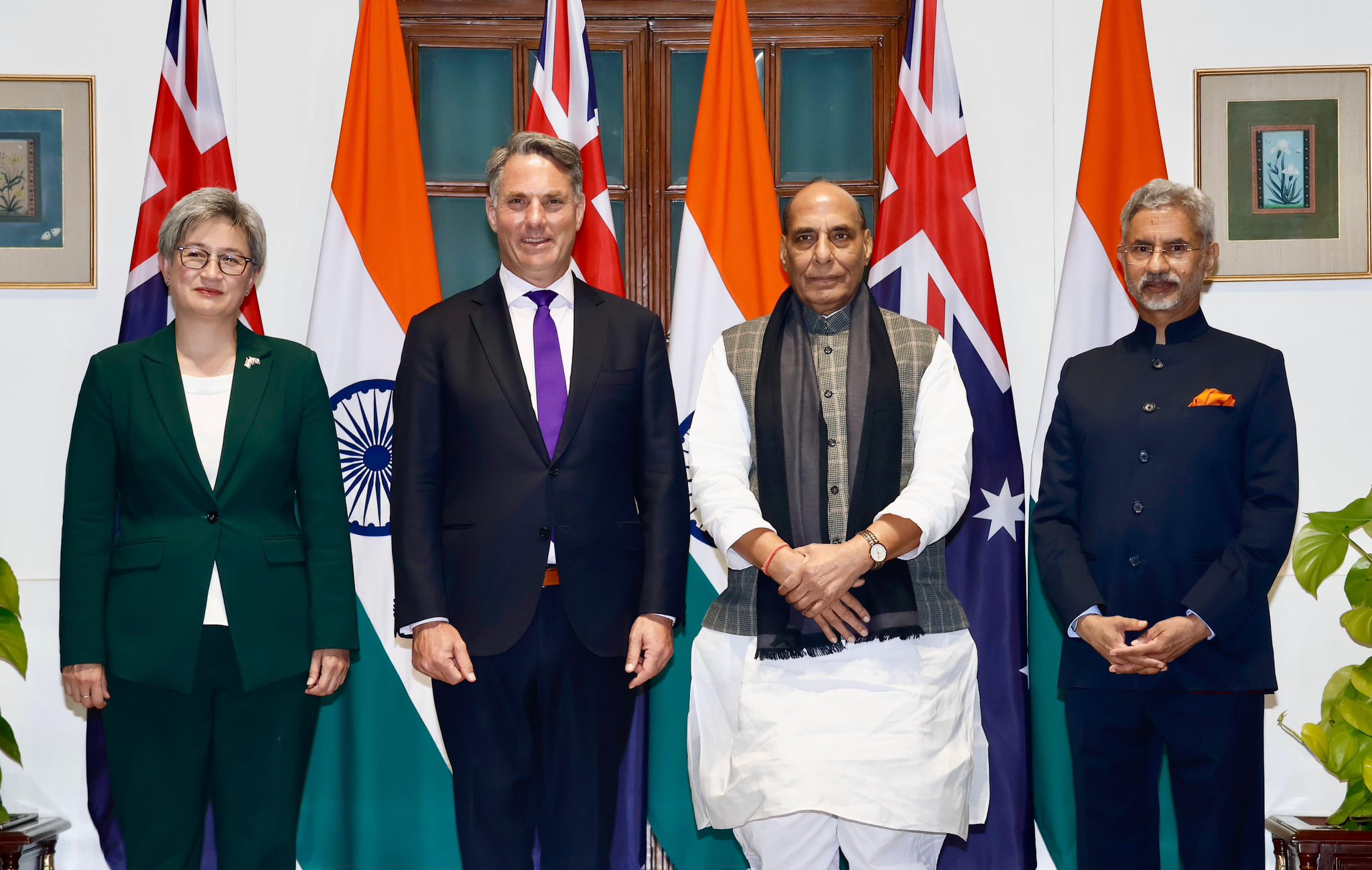The second India-Australia 2+2 Foreign and Defence Ministerial Dialogue concluded in New Delhi, solidifying the Comprehensive Strategic Partnership (CSP) between the two nations. The dialogue took place on November 20-21 between India’s Minister of Defence, Rajnath Singh, Minister of External Affairs, Dr. S. Jaishankar, and their Australian counterparts, Deputy Prime Minister and Minister for Defence, Richard Marles, and Minister for Foreign Affairs, Penny Wong.
Enhancing Regional Cooperation
The ministers welcomed the positive momentum of the India-Australia CSP, emphasizing its benefits for both nations and the broader region. Notable progress was acknowledged since the first India-Australia Annual Summit in March 2023, with commitments to continued collaboration in diplomacy, defence, and development activities. High-level contacts have strengthened cooperation across diverse areas, including defence and security, trade, education, cyber and space, climate change, and renewable energy.
Global Commitments
Australia’s strong support for India’s G20 Presidency was appreciated, and both sides reiterated their commitment to working together on global issues. The Voice of Global South Summit hosted by India garnered support from Australia, reflecting the shared dedication to addressing issues such as health, food security, and economic growth in the developing world.
Concerns on Global Conflicts
The ministers expressed deep concern about the war in Ukraine, emphasizing the need for a comprehensive, just, and durable peace in line with UN principles. The statement also condemned terrorist attacks against Israel and highlighted the commitment to coordinate humanitarian assistance in the region. Concerns about the deteriorating situation in Myanmar were addressed, with a call for an immediate cessation of violence and support for ASEAN-led efforts.
Regional Stability in Focus
The ministers underscored their commitment to sovereignty and territorial integrity in the Indo-Pacific, democratic values, rule of law, freedom of navigation, and peaceful dispute resolution. Emphasizing dialogue and diplomacy as the preferred approach to conflicts, they called for adherence to international law in addressing challenges in the East and South China Seas. The militarization of disputed features and the use of coast guard and maritime militia vessels were highlighted as concerns.
Empowering Regional Partnerships
The Quad partnership was reaffirmed as a force for regional and global good. Progress made at the Leaders’ Summit in Hiroshima in May 2023 was acknowledged, with anticipation for the Quad Leaders’ Summit to be hosted in India in 2024. The ministers also expressed ongoing support for ASEAN centrality and regional architectures like the East Asia Summit and ASEAN Defence Ministers’ Meeting Plus.
Maritime Cooperation and Security
The dialogue emphasized the importance of maritime domain awareness, with commitments to the Australia-India Maritime Dialogue and trilateral groupings with France and Indonesia. The Indo-Pacific Partnership for Maritime Domain Awareness initiative was highlighted for strengthening regional collaboration. Concerns about the militarization of disputed features and disruptions to offshore activities were raised, reiterating the call for adherence to international law, particularly UNCLOS.
Defence and Security Collaboration
The ministers recognized the pivotal role of the defence relationship, highlighting joint exercises, 2+2 Ministerial Dialogues, and Defence Policy Talks. Enhanced interoperability, cooperation on maritime security, and combating illegal fishing were prioritized. Progress in reciprocal logistics support, air-to-air refueling cooperation, and military-to-military cooperation were acknowledged. The importance of countering terrorism and cyber-related crimes was also stressed.
Technology and Industry Collaboration
Both nations highlighted the significance of technology and industry cooperation, with the launch of the India-Australia Rapid Innovation and Start-up Expansion Accelerator. The focus on secure, resilient, and trusted technology and supply chains to enhance national security and economic growth was emphasized. Collaboration in critical minerals, renewable energy, and the India-Australia Energy Dialogue were noted as crucial aspects of the bilateral relationship.
Institutional Chemistry and People-to-People Ties
Efforts to build institutional chemistry were recognized, including the opening of new diplomatic missions in Bengaluru and Brisbane. The expansion of Senior Officials Consultations, the establishment of the Centre for Australia-India Relations (CAIR), and the India-Australia Strategic Dialogue were announced to deepen cooperation. The Consulate-General in Bengaluru is expected to strengthen technology partnerships, while the Consulate-General in Brisbane will support the growing Indian community in Australia.
Economic Engagement and Education Cooperation
Progress in economic engagement, including the India-Australia Economic Cooperation and Trade Agreement (ECTA), was highlighted. The signing of the Mechanism for Mutual Recognition of Qualifications and the India-Australia Education and Skills Council (AIESC) meeting underscored commitment to cooperation in education and skill development.
Both sides will now be looking forward to holding the third 2+2 Ministerial Dialogue in 2025.














